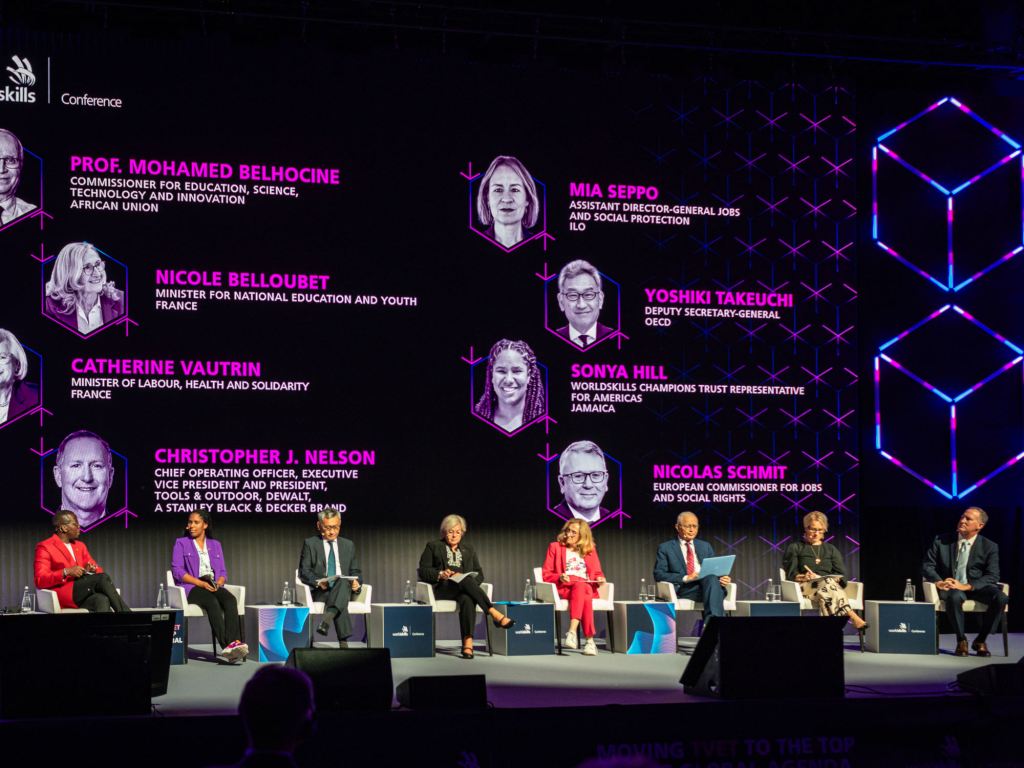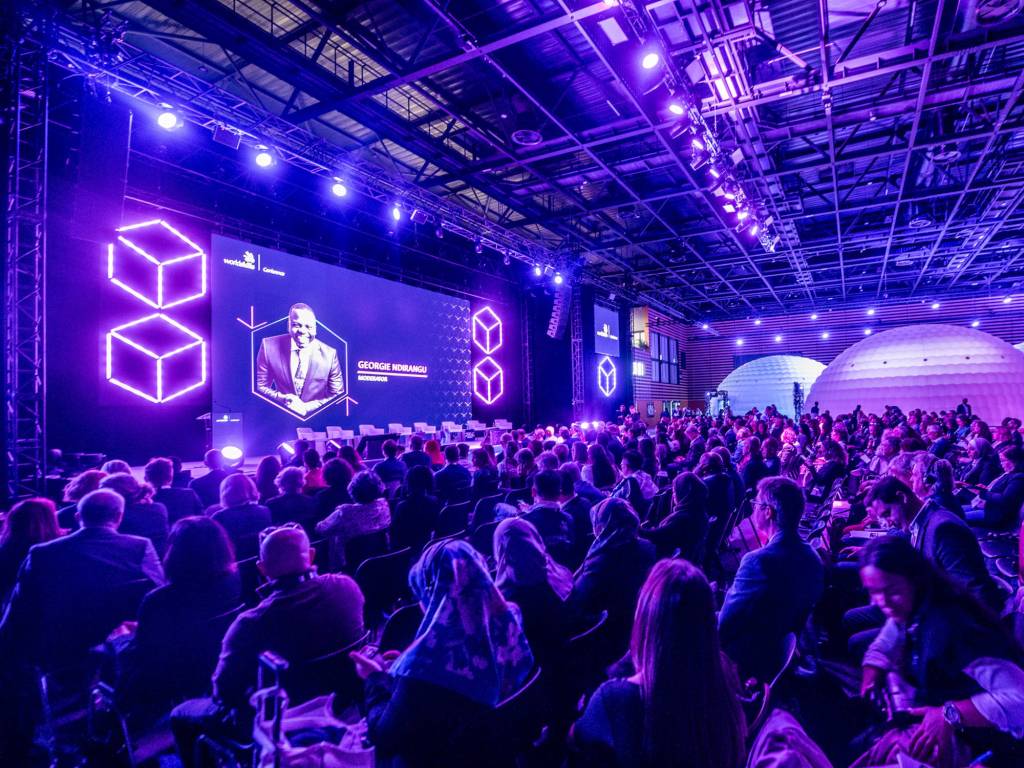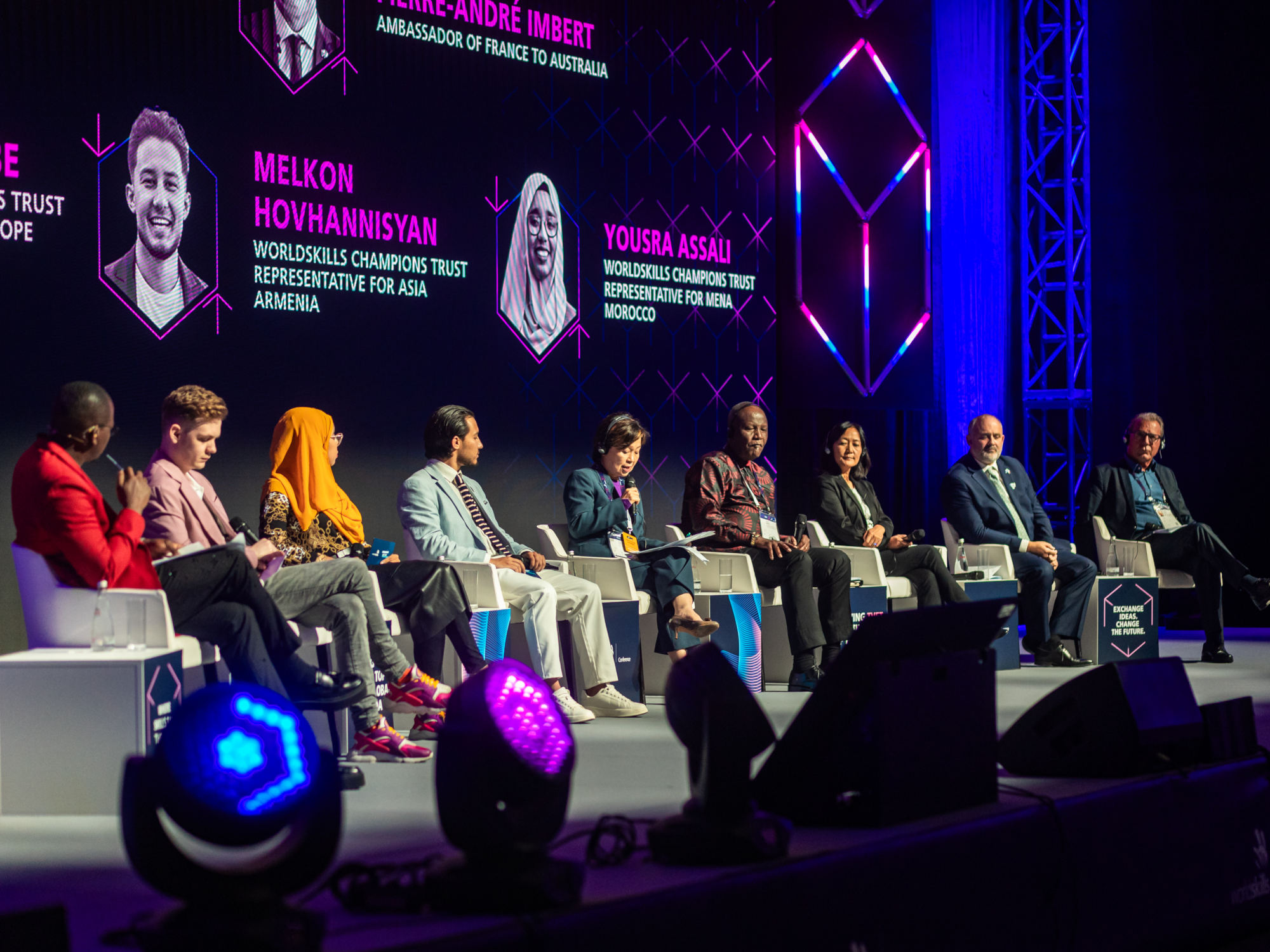Today a powerful coalition of government, policy, industry and education leaders, and young people came together to discuss Technical and Vocational Education and Training (TVET) systems worldwide and how to equip young people with the skills needed for a fast-changing, uncertain future.
The day began with welcome addresses from two esteemed French Ministers – Catherine Vautrin, Minister for Labour, Health and Solidarity, and Nicole Belloubet, Minister for National Education and Youth. Chris Humphries, President of WorldSkills, then reinforced the need to elevate skills as a priority saying, “This Conference is just weeks ahead of the UN Summit of the Future, where world leaders will gather to forge consensus on how to safeguard all our futures. Too often, skills development has not had adequate recognition to reflect the economic and societal return on investment they produce. We are on a mission to change that.”
After thanking the French Republic, co-host of the Conference, Chris handed over to global thought leaders and policymakers for the Opening Plenary and a panel which included Professor Mohamed Belhocine from the African Union, Mia Seppo from the ILO, Sonya Hill, WorldSkills Champions Trust representative for the Americas, Christopher J. Nelson from Stanley Black & Decker, and Yoshiki Takeuchi from the OECD.
Each speaker underscored the necessity of elevating TVET’s prominence and securing adequate resources. In the discussion, Mia Seppo said, “TVET is a tool to address the disconnect between jobs, skills, and people’s aspirations. It empowers people to have fulfilling careers, helps enterprises find people with skills, and supports economies to reach a sustainable development path.”
Sonya Hill stressed how important it is to shift perceptions of TVET, saying, “Misconceptions around TVET have discouraged people from considering it as a viable career option. Yet people who have gone through TVET training have become successful and have the power to change the narrative.”

Excellence in TVET was a cornerstone theme of day one and was debated in two pivotal sessions. Raising the Bar: How Do We Create Excellence in Every TVET System? saw dignitaries and Ministers from Germany, Hong Kong, and Zambia sharing diverse strategies for achieving TVET excellence across different contexts. Meanwhile, the discussion on Collaborating Towards Success: Tools and Strategies for Quality Assurance in TVET drew attention to innovative approaches that help TVET systems meet the evolving needs of industries and learners alike.
Two sessions today explored both the challenges and the opportunities around gender equity in skills and Science Technology Engineering and Mathematics (STEM). Breaking Stereotypes: Building Gender Equity in Skills looked at strategies to create more inclusive TVET policies and bridge labour market gender gaps, while Reimagining Workplaces, Cultivating Inclusion: Attracting More Women into STEM showcased successful initiatives that have increased women and girls’ participation in STEM fields.
El Iza Mohamedou, Head of Centre for Skills at the OECD, said “Building gender equity in skills goes far beyond attracting more women into the workplace. It is also about inclusion. People from underrepresented genders need to have a voice, take part in decision-making, and have career development.”
The Conference also spotlighted TVET’s crucial role in addressing global challenges, specifically related to pressing social and environmental issues. Keeping Climate Promises: How TVET Can Lead the Green Transition explored how skills development can drive sustainable practices. The session Displacement, Climate Change, and Conflict: Skills Initiatives for Fragile Economies focused on the potential of skills in vulnerable contexts.
Fabio Jiménez, Head of Labour Mobility and Markets Unit, Labour Mobility Division, International Organization for Migration IOM, expressed the importance of engaging with displaced communities. He said, “We address issues in countries facing emergencies and recovering from crises through collaboration by working with other UN agencies and with the support of other countries. But we also use previous learnings from displaced migrant populations who have been living on the land for generations.”

Participants left Eurexpo Lyon enriched from everything they heard in the sessions and saw at curated tours of the Competition. Tomorrow, delegates can expect deeper exploration of critical topics, including AI and the future of skills, data for better skill systems, and foundational skills for better TVET.
If you cannot attend in person, you can watch the livestream of the BeChangeMaker 2024 finale and the Closing Plenary session.
You can also catch insights shared from speakers in our Conference “live blog.”
WorldSkills Lyon 2024, 10 to 15 September, is the world’s largest international skills competition, featuring 1,400 Competitors from almost 70 countries and regions. The 47th WorldSkills Competition showcases excellence in young skilled talent, while also bringing industry, education, and government leaders together to move skills to the top of the global agenda. WorldSkills is highlighting the critical role skills play in addressing global challenges, boosting economies and industries, and promoting excellence.

